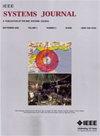FIPO: A Lightweight and Customized Software-Defined Programmable Packet Scheduling Primitive
IF 4.4
3区 计算机科学
Q1 COMPUTER SCIENCE, INFORMATION SYSTEMS
引用次数: 0
Abstract
The current Internet struggles to meet the deterministic transmission requirements in terms of end-to-end delay. Time-sensitive networking (TSN) provides a solution by offering deterministic forwarding services for critical flows, ensuring strict latency requirements. However, the costs and complexity of hardware associated with TSN increases the barriers for researchers to build prototype for validating newly proposed queue scheduling algorithms. To address this dilemma, software-based simulation platforms are widely used for reduction of simulation expenses. However, these platforms cannot flexibly simulate various queue scheduling algorithms. Although existing programmable packet scheduling methods can adapt to TSN queue scheduling algorithms for common hardware base, they cannot be directly applied to software-based TSN simulation platforms. In response, we propose a novel lightweight software-defined packet scheduling primitive—first-in-pick-out (FIPO), based on the programmable switch behavior-model-version-2 (BMV2). FIPO is capable of expressing customized queue scheduling algorithms to support current TSN algorithms and can be flexibly extended to future algorithms. Particularly, FIPO consists only of multipriority queues and eligible time comparator to implement TSN queue scheduling with minimal computational and management overhead. We also propose a fine-grained logical queue-based flow queue mechanism to enhance FIPO. Finally, a lightweight prototype system for the FIPO is established, incorporating four customized deterministic scheduling algorithms. Extensive experimental results show that FIPO can quickly implement customized queue scheduling algorithms and simulate network conditions that closely resemble real environments. It also demonstrates increased implementation flexibility, achieving millisecond-level configuration times with only a moderate increase in CPU utilization (less than 10%).FIPO:一种轻量级的自定义软件定义可编程包调度原语
当前的互联网在端到端延迟方面难以满足确定性传输要求。TSN (Time-sensitive networking)通过为关键流提供确定性的转发服务,保证严格的延迟要求,提供了一种解决方案。然而,与TSN相关的硬件成本和复杂性增加了研究人员构建验证新提出的队列调度算法的原型的障碍。为了解决这一困境,基于软件的仿真平台被广泛使用,以减少仿真费用。然而,这些平台不能灵活地模拟各种队列调度算法。现有的可编程分组调度方法虽然可以适应通用硬件基础上的TSN队列调度算法,但不能直接应用于基于软件的TSN仿真平台。作为回应,我们提出了一种基于可编程交换机行为模型版本2 (BMV2)的新型轻量级软件定义数据包调度基本先入先取(FIPO)。FIPO能够表达自定义队列调度算法,以支持当前的TSN算法,并可以灵活地扩展到未来的算法。特别是,FIPO仅由多优先级队列和合适的时间比较器组成,以最小的计算和管理开销实现TSN队列调度。我们还提出了一种基于细粒度逻辑队列的流队列机制来增强FIPO。最后,结合四种自定义确定性调度算法,建立了FIPO的轻量级原型系统。大量的实验结果表明,FIPO可以快速实现自定义队列调度算法,并模拟与真实环境非常相似的网络条件。它还展示了更高的实现灵活性,实现了毫秒级的配置时间,而CPU利用率仅略有增加(不到10%)。
本文章由计算机程序翻译,如有差异,请以英文原文为准。
求助全文
约1分钟内获得全文
求助全文
来源期刊

IEEE Systems Journal
工程技术-电信学
CiteScore
9.80
自引率
6.80%
发文量
572
审稿时长
4.9 months
期刊介绍:
This publication provides a systems-level, focused forum for application-oriented manuscripts that address complex systems and system-of-systems of national and global significance. It intends to encourage and facilitate cooperation and interaction among IEEE Societies with systems-level and systems engineering interest, and to attract non-IEEE contributors and readers from around the globe. Our IEEE Systems Council job is to address issues in new ways that are not solvable in the domains of the existing IEEE or other societies or global organizations. These problems do not fit within traditional hierarchical boundaries. For example, disaster response such as that triggered by Hurricane Katrina, tsunamis, or current volcanic eruptions is not solvable by pure engineering solutions. We need to think about changing and enlarging the paradigm to include systems issues.
 求助内容:
求助内容: 应助结果提醒方式:
应助结果提醒方式:


